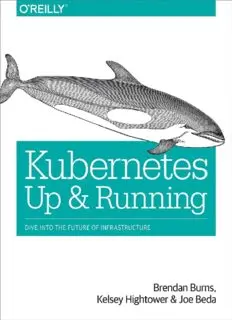Table Of ContentKubernetes: Up and Running
Dive into the Future of Infrastructure
Kelsey Hightower, Brendan Burns, and Joe Beda
Kubernetes: Up and Running
by Kelsey Hightower, Brendan Burns, and Joe Beda
Copyright © 2017 Kelsey Hightower, Brendan Burns, and Joe Beda. All rights
reserved.
Printed in the United States of America.
Published by O’Reilly Media, Inc., 1005 Gravenstein Highway North,
Sebastopol, CA 95472.
O’Reilly books may be purchased for educational, business, or sales promotional
use. Online editions are also available for most titles (http://oreilly.com/safari).
For more information, contact our corporate/institutional sales department: 800-
998-9938 or [email protected].
Editor: Angela Rufino
Production Editor: Melanie Yarbrough
Copyeditor: Christina Edwards
Proofreader: Rachel Head
Indexer: Kevin Broccoli
Interior Designer: David Futato
Cover Designer: Karen Montgomery
Illustrator: Rebecca Demarest
September 2017: First Edition
Revision History for the First Edition
2017-09-05: First Release
See http://oreilly.com/catalog/errata.csp?isbn=9781491935675 for release
details.
The O’Reilly logo is a registered trademark of O’Reilly Media, Inc. Kubernetes:
Up and Running, the cover image, and related trade dress are trademarks of
O’Reilly Media, Inc.
While the publisher and the authors have used good faith efforts to ensure that
the information and instructions contained in this work are accurate, the
publisher and the authors disclaim all responsibility for errors or omissions,
including without limitation responsibility for damages resulting from the use of
or reliance on this work. Use of the information and instructions contained in
this work is at your own risk. If any code samples or other technology this work
contains or describes is subject to open source licenses or the intellectual
property rights of others, it is your responsibility to ensure that your use thereof
complies with such licenses and/or rights.
978-1-491-93567-5
[LSI]
For Klarissa and Kelis, who keep me sane. And for my Mom, who taught me a
strong work ethic and how to rise above all odds. — Kelsey Hightower
For my Dad, who helped me fall in love with computers by bringing home
punch cards and dot matrix banners. — Joe Beda
For Robin, Julia, Ethan, and everyone who bought cookies to pay for that
Commodore 64 in my third-grade class. — Brendan Burns
Preface
Kubernetes: A Dedication
Kubernetes would like to thank every sysadmin who has woken up at 3 a.m. to
restart a process. Every developer who pushed code to production only to find
that it didn’t run like it did on their laptop. Every systems architect who
mistakenly pointed a load test at the production service because of a leftover
hostname that they hadn’t updated. It was the pain, the weird hours, and the
weird errors that inspired the development of Kubernetes. In a single sentence:
Kubernetes intends to radically simplify the task of building, deploying, and
maintaining distributed systems. It has been inspired by decades of real-world
experience building reliable systems and it has been designed from the ground
up to make that experience, if not euphoric, at least pleasant. We hope you enjoy
the book!
Who Should Read This Book
Whether you are new to distributed systems or have been deploying cloud-native
systems for years, containers and Kubernetes can help you achieve new levels of
velocity, agility, reliability, and efficiency. This book describes the Kubernetes
cluster orchestrator and how its tools and APIs can be used to improve the
development, delivery, and maintenance of distributed applications. Though no
previous experience with Kubernetes is assumed, to make maximal use of the
book you should be comfortable building and deploying server-based
applications. Familiarity with concepts like load balancers and network storage
will be useful, though not required. Likewise, experience with Linux, Linux
containers, and Docker, though not essential, will help you make the most of this
book.
Why We Wrote This Book
We have been involved with Kubernetes since its very beginnings. It has been
truly remarkable to watch it transform from a curiosity largely used in
experiments to a crucial production-grade infrastructure that powers large-scale
production applications in varied fields, from machine learning to online
services. As this transition occurred, it became increasingly clear that a book that
captured both how to use the core concepts in Kubernetes and the motivations
behind the development of those concepts would be an important contribution to
the state of cloud-native application development. We hope that in reading this
book, you not only learn how to build reliable, scalable applications on top of
Kubernetes, but also that you receive insight into the core challenges of
distributed systems that led to its development.
A Word on Cloud-Native Applications Today
From the first programming languages, to object-oriented programming, to the
development of virtualization and cloud infrastructure, the history of computer
science is a history of the development of abstractions that hide complexity and
empower you to build ever more sophisticated applications. Despite this, the
development of reliable, scalable applications is still dramatically more
challenging than it ought to be. In recent years, containers and container
orchestration APIs like Kubernetes have become an important abstraction that
radically simplifies the development of reliable, scalable distributed systems.
Though containers and orchestrators are still in the process of entering the
mainstream, they are already enabling developers to build and deploy
applications with a speed, agility, and reliability that would have seemed like
science fiction only a few years ago.

